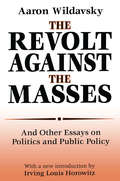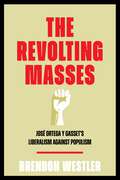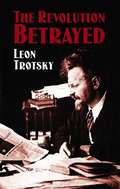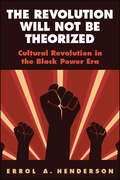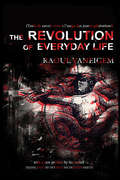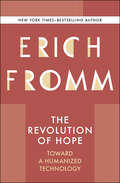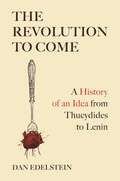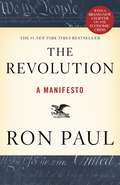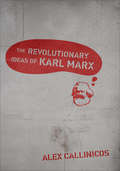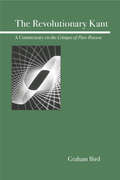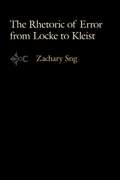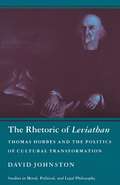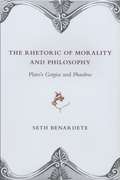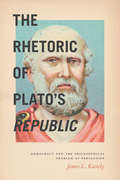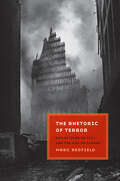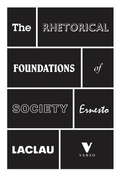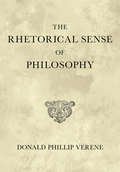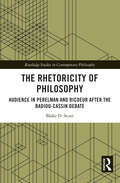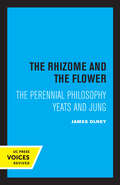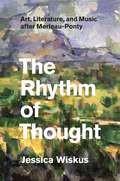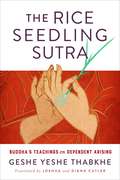- Table View
- List View
The Revolt Against the Masses: And Other Essays on Politics and Public Policy
by Aaron WildavskyThe author of this stunning set of essays on politics and public policy makes crystal clear the meaning of the title. "The revolutionaries of contemporary America do not seek to redistribute privilege from those who have it to those who do not. These radicals wish to arrange a transfer of power from those elites who now exercise it to another elite, namely themselves, who do not. This aspiring elite is of the same race (white), the same class (upper middle and upper), and the same educational background (the best colleges and universities) as those they wish to displace." Wildavsky's bracing work takes a close look at these elites, who probably make up little more than one percent of the population. He sees their common denominator as hostility toward the masses, anti-American attitudes, derision of authority, and a belief in participatory rather than representative politics. The author carries through these themes in a variety of essays on black-white racial relations, social work orientations and black militancy, the politics of budgetary reform, elite and mass trends in the political party system, and the substitution of bureaucratic for democratic modes of advancing the policy process. This work is, in short, vintage Wildavsky: tough minded, spirited, and plain-spoken political analysis. In his new Introduction, Irving Louis Horowitz examines what has changed and what continues to be salient in Wildavsky's line of analysis. Essentially, the report card on The Revolt Against the Masses is that the situation described in these essays has changed somewhat in style but hardly at all in substance. The nuclear shield replaces the ABM treaty, and Afghanistan replaces Vietnam as centers of political gravity-but the same coalition of forces across party and economy still dominate the American political process. The justifiably famous essay on "The Two Presidencies" shows how persistent is the gap between the conflict over domestic priorities and the consensus on foreign policy-and why. This is, in short, a classic text that continues to merit careful study by all those interested in political life. Aaron Wildavsky was, until his death in 1993, professor of political science and public policy at the University of California in Berkeley. He was also director of its Survey Research Center. He served as director of the Russell-Sage Foundation, was a president of the American Political Science Association, and held a number of visiting professorships during his lifetime. Most recently, Transaction has posthumously published Wildavsky's complete essays and papers in five volumes. Irving Louis Horowitz is Hannah Arendt distinguished university professor emeritus at Rutgers, The State University, and longtime friend and associate of Aaron Wildavsky.
The Revolting Masses: José Ortega y Gasset’s Liberalism Against Populism
by Brendon WestlerJosé Ortega y Gasset (1883–1955) was a Spanish philosopher and essayist best known for The Revolt of the Masses, first translated into English in 1932. In it, Ortega critiques a populist deformation of democracy by the rise of a “mass mentality” characterized by selfishness, a lack of curiosity, and a general indifference to the opinions and attitudes of others. However, as Brendon Westler makes clear, we need to look beyond Ortega’s arguments about populism and democracy in his most famous work to recover the philosopher’s expansive political outlook and to identify his valuable contributions to the history and advancement of liberalism.Westler’s book reconstructs Ortega’s political theory, underscoring its distinctive historical origins as well as the ways in which it might be instructive to us today. Through an exploration of works less familiar to an English-speaking audience, such as Concord and Liberty, “Vieja y nueva política,” “De Europa meditatio Quaedam,” and “Democracia morbosa,” combined with a sensitivity to larger social and political ideas circulating within Spain, The Revolting Masses traces the contours of Ortega’s approach to politics. Westler argues that reading texts written over the course of the philosopher’s entire career, in combination with The Revolt of the Masses, offers a more complete picture of Ortega’s political thought—one that advocates for a liberal ethos as an answer to populism and promotes both individual freedom and the preservation of community bonds.As The Revolting Masses shows, Ortega was, above all, a philosopher who reflected on what it would take for people of differing beliefs to live together. His unique conception of liberalism, grounded in the Spanish tradition, not only emphasizes pluralism and diversity of thought and institutions but also serves as a potential antidote to the populism of our present moment.
The Revolution Betrayed
by Leon Trotsky Max EastmanOne of Marxism's most important texts, The Revolution Betrayed explores the fate of the Russian Revolution after Lenin's death. Written in 1936 and published the following year, this brilliant and profound evaluation of Stalinism from the Marxist standpoint prophesied the collapse of the Soviet Union and subsequent related events.The effects of the October Revolution led to the establishment of a nationalized planned economy, demonstrating the practicality of socialism for the first time. By the 1930s, however, the Soviet workers' democracy had crumbled into a state of bureaucratic decay that ultimately gave rise to an infamous totalitarian regime. Trotsky employs facts, figures, and statistics to show how Stalinist policies rejected the enormous productive potential of the nationalized planned economy in favor of a wasteful and corrupt bureaucratic system.Six decades after the publication of this classic, the shattering of Stalinist regimes in Russia and Eastern Europe has confused and demoralized countless political activists. The Revolution Betrayed offers readers of every political persuasion an insider's view of what went wrong.
The Revolution Will Not Be Theorized: Cultural Revolution in the Black Power Era (SUNY Press Open Access)
by Errol A. HendersonThe study of the impact of Black Power Movement (BPM) activists and organizations in the 1960s through ʼ70s has largely been confined to their role as proponents of social change; but they were also theorists of the change they sought. In The Revolution Will Not Be Theorized Errol A. Henderson explains this theoretical contribution and places it within a broader social theory of black revolution in the United States dating back to nineteenth-century black intellectuals. These include black nationalists, feminists, and anti-imperialists; activists and artists of the Harlem Renaissance; and early Cold War–era black revolutionists. The book first elaborates W. E. B. Du Bois's thesis of the "General Strike" during the Civil War, Alain Locke's thesis relating black culture to political and economic change, Harold Cruse's work on black cultural revolution, and Malcolm X's advocacy of black cultural and political revolution in the United States. Henderson then critically examines BPM revolutionists' theorizing regarding cultural and political revolution and the relationship between them in order to realize their revolutionary objectives. Focused more on importing theory from third world contexts that were dramatically different from the United States, BPM revolutionists largely ignored the theoretical template for black revolution most salient to their case, which undermined their ability to theorize a successful black revolution in the United States.This book is freely available in an open access edition thanks to TOME (Toward an Open Monograph Ecosystem)—a collaboration of the Association of American Universities, the Association of University Presses, and the Association of Research Libraries—and the generous support of The Pennsylvania State University. Learn more at the TOME website, available at: openmonographs.org, and access the book online at http://muse.jhu.edu/book/67098. It is also available through the SUNY Open Access Repository at http://hdl.handle.net/20.500.12648/1704.
The Revolution of Everyday Life: Aka The Revolution Of Everyday Life
by Raoul VaneigemOne of the most important exponents of Situationist ideas, this treatise presents an impassioned critique of modern capitalism and serves as a cornerstone of modern radical thought. Originally published in early 1968, the book both kindled and colored the May 1968 upheavals in France that captured the attention of the world. In the political climate of today, Raoul Vaneigem's important work of radical anticapitalist thought has struck a new chord with the worldwide Occupy Movement. Naming and defining the alienating features of everyday life in consumer society—survival rather than living in full, the call to sacrifice, the cultivation of false needs, the dictatorship of the commodity, subjection to social roles, and the replacement of God by the economy—the book argues that the countervailing impulses that exist deep within this alienation, such as creativity, spontaneity, and poetry, present an authentic alternative to nihilistic consumerism. This carefully edited new translation marks the first North American publication of this important work and includes a new preface by the author and a translator's note.
The Revolution of Hope: Toward a Humanized Technology
by Erich FrommThe acclaimed social psychologist and New York Times–bestselling author examines how to maintain hope and humanity in an increasingly technological society. Life often contains events that do not have the outcomes we desire. However, many situations offer the possibility of a better outcome later. We simply need hope. But what is hope? What happens if we choose it? And what happens if we give it up? In The Revolution of Hope, Erich Fromm contemplates the definition of hope and what it means to be human. When the book was first published in 1968, Fromm saw society heading towards complete mechanization, devoted to maximal material output and consumption, directed by computers. With this book, he poses to the reader the choice between becoming a helpless cog in the machine or embracing humanism and hope. &“An uplifting exploration of the definition of hope, what it truly means to be human, and steps that should be taken to promote humanization in an increasingly disconnected and technology-driven society.&” —Midwest Book Review
The Revolution to Come: A History of an Idea from Thucydides to Lenin
by Dan EdelsteinHow an event once considered the greatest of all political dangers came to be seen as a solution to all social problemsPolitical thinkers from Plato to John Adams saw revolutions as a grave threat to society and advocated for a constitution that prevented them by balancing social interests and forms of government. The Revolution to Come traces how evolving conceptions of history ushered in a faith in the power of revolution to create more just and reasonable societies.Taking readers from Greek antiquity to Leninist Russia, Dan Edelstein describes how classical philosophers viewed history as chaotic and directionless, and sought to keep historical change—especially revolutions—at bay. This conception prevailed until the eighteenth century, when Enlightenment thinkers conceived of history as a form of progress and of revolution as its catalyst. These ideas were put to the test during the French Revolution and came to define revolutions well into the twentieth century. Edelstein demonstrates how the coming of the revolution leaves societies divided over its goals, giving rise to new forms of violence in which rivals are targeted as counterrevolutionaries.A panoramic work of intellectual history, The Revolution to Come challenges us to reflect on the aims and consequences of revolution and to balance the value of stability over the hope for change in our own moment of fear and upheaval.
The Revolution: A Manifesto
by Ron Paul#1 NEW YORK TIMES BESTSELLERThis much is true: You have been lied to. The government is expanding. Taxes are increasing. More senseless wars are being planned. Inflation is ballooning. Our basic freedoms are disappearing. The Founding Fathers didn't want any of this. In fact, they said so quite clearly in the Constitution of the United States of America. Unfortunately, that beautiful, ingenious, and revolutionary document is being ignored more and more in Washington. If we are to enjoy peace, freedom, and prosperity once again, we absolutely must return to the principles upon which America was founded. But finally, there is hope . . . In THE REVOLUTION, Texas congressman and presidential candidate Ron Paul has exposed the core truths behind everything threatening America, from the real reasons behind the collapse of the dollar and the looming financial crisis, to terrorism and the loss of our precious civil liberties. In this book, Ron Paul provides answers to questions that few even dare to ask. Despite a media blackout, this septuagenarian physician-turned-congressman sparked a movement that has attracted a legion of young, dedicated, enthusiastic supporters . . . a phenomenon that has amazed veteran political observers and made more than one political rival envious. Candidates across America are already running as "Ron Paul Republicans.""Dr. Paul cured my apathy," says a popular campaign sign. THE REVOLUTION may cure yours as well.
The Revolutionary Ideas of Karl Marx
by Alex CallinicosAn accessible introduction to the author of Capital and coauthor of The Communist Manifesto, with a focus on his relevance in today&’s world. Few thinkers have been declared irrelevant and out-of-date with such frequency as Karl Marx. Hardly a decade has gone by since his death in which establishment critics have not announced the death of his theory. And yet, despite their best efforts to bury him, Marx&’s specter continues to haunt his detractors more than a century after his passing. As the boom and bust cycle of global capitalism continues to widen inequality around the world, a new generation is discovering that the problems Marx addressed in his time are remarkably similar to those of our own. In this engaging and accessible introduction, Alex Callinicos demonstrates that Marx&’s ideas hold an enduring relevance for today&’s activists fighting against poverty, oppression, environmental destruction, and the numerous other injustices of the capitalist system.
The Revolutionary Kant
by Graham BirdThe Revolutionary Kant offers a new appreciation of Kant's classic, arguing that Kant's reform of philosophy was far more radical than has been previously understood. The book examines his proposed revolutionary reform - to abandon traditional metaphysics and point philosophy in a new direction - and contends that critics have misrepresented conflicts between Kant and his predecessors. Kant, Bird argues, was not a flawed innovator but an advocate of a new philosophical project, one that began to be appreciated only in the twentieth century.
The Rhetoric and the Poetics of Aristotle
by AristotleTranslated by Rhys Roberts and Ingram Bywater, Introduction by Edward P. J. Corbett
The Rhetoric of Error from Locke to Kleist
by Zachary SngSng focuses on literary and philosophical accounts of the relationship between language and thought. Rather than approaching its topic conceptually or historically, he takes on canonical texts of the Enlightenment and Romanticism and engages with their rhetorical strategies.
The Rhetoric of Leviathan: Thomas Hobbes and the Politics of Cultural Transformation (Studies in Moral, Political, and Legal Philosophy #1)
by David JohnstonThe description for this book, The Rhetoric of Leviathan: Thomas Hobbes and the Politics of Cultural Transformation, will be forthcoming.
The Rhetoric of Morality and Philosophy: Plato's Gorgias and Phaedrus
by Seth BenardeteIn this volume, Seth Benardete interprets and pairs two important Platonic dialogues, the Gorgias and the Phaedrus, illuminating Socrates' notion of rhetoric and Plato's conception of morality and eros in the human soul. Following his discussion of the Gorgias as a dialogue about the rhetoric of morality, Benardete turns to the Phaedrus as a discourse about genuine rhetoric, namely the science of eros, or true philosophy.
The Rhetoric of Plato's Republic: Democracy and the Philosophical Problem of Persuasion
by James L. KastelyPlato isn't exactly thought of as a champion of democracy, and perhaps even less as an important rhetorical theorist. In this book, James L. Kastely recasts Plato in just these lights, offering a vivid new reading of one of Plato's most important works: the Republic. At heart, Kastely demonstrates, the Republic is a democratic epic poem and pioneering work in rhetorical theory. Examining issues of justice, communication, persuasion, and audience, he uncovers a seedbed of theoretical ideas that resonate all the way up to our contemporary democratic practices. As Kastely shows, the Republic begins with two interrelated crises: one rhetorical, one philosophical. In the first, democracy is defended by a discourse of justice, but no one can take this discourse seriously because no one can see--in a world where the powerful dominate the weak--how justice is a value in itself. That value must be found philosophically, but philosophy, as Plato and Socrates understand it, can reach only the very few. In order to reach its larger political audience, it must become rhetoric; it must become a persuasive part of the larger culture--which, at that time, meant epic poetry. Tracing how Plato and Socrates formulate this transformation in the Republic, Kastely isolates a crucial theory of persuasion that is central to how we talk together about justice and organize ourselves according to democratic principles.
The Rhetoric of Plato's Republic: Democracy and the Philosophical Problem of Persuasion
by James L. KastelyPlato isn’t exactly thought of as a champion of democracy, and perhaps even less as an important rhetorical theorist. In this book, James L. Kastely recasts Plato in just these lights, offering a vivid new reading of one of Plato’s most important works: the Republic. At heart, Kastely demonstrates, the Republic is a democratic epic poem and pioneering work in rhetorical theory. Examining issues of justice, communication, persuasion, and audience, he uncovers a seedbed of theoretical ideas that resonate all the way up to our contemporary democratic practices. As Kastely shows, the Republic begins with two interrelated crises: one rhetorical, one philosophical. In the first, democracy is defended by a discourse of justice, but no one can take this discourse seriously because no one can see—in a world where the powerful dominate the weak—how justice is a value in itself. That value must be found philosophically, but philosophy, as Plato and Socrates understand it, can reach only the very few. In order to reach its larger political audience, it must become rhetoric; it must become a persuasive part of the larger culture—which, at that time, meant epic poetry. Tracing how Plato and Socrates formulate this transformation in the Republic, Kastely isolates a crucial theory of persuasion that is central to how we talk together about justice and organize ourselves according to democratic principles.
The Rhetoric of Terror: Reflections on 9/11 and the War on Terror
by Marc RedfieldThe terrorist attacks of September 11, 2001, did symbolic as well as literal damage. A trace of this cultural shock echoes in the American idiom “9/11”: a bare name-date conveying both a trauma (the unspeakable happened then) and a claim on our knowledge. In the first of the two interlinked essays making up The Rhetoric of Terror, Marc Redfield proposes the notion of “virtual trauma” to describe the cultural wound that this name-date both deflects and relays. Virtual trauma describes the shock of an event at once terribly real and utterly mediated. In consequence, a tormented self-reflexivity has tended to characterize representations of 9/11 in texts, discussions, and films, such as World Trade Center and United 93.In the second half of the book, Redfield examines the historical and philosophical infrastructure of the notion of “war on terror.” Redfield argues that the declaration of war on terror is the exemplary postmodern sovereign speech act: it unleashes war as terror and terror as war, while remaining a crazed, even in a certain sense fictional performative utterance. Only a pseudosovereign—the executive officer of the world’s superpower—could have declared this absolute, phantasmatic, yet terribly damaging war. Though politicized terror and absolute war have their roots in the French Revolution and the emergence of the modern nation-state, Redfield suggests that the idea of a war on terror relays the complex, spectral afterlife of sovereignty in an era of biopower, global capital, and telecommunication.A moving, wide-ranging, and rigorous meditation on the cultural tragedy of our era, The Rhetoric of Terror also unfolds as an act of mourning for Jacques Derrida. Derrida’s groundbreaking philosophical analysis of iterability—iterability as the exposure to repetition with a difference elsewhere that makes all technics, signification, and psychic life possible—helps us understand why questions of mediation and aesthetics so rapidly become so fraught in our culture; why efforts to repress our essential political, psychic, and ontological vulnerability generate recursive spasms of violence; why ethical living-together involves uninsurable acts of hospitality. The Rhetoric of Terror closes with an affirmation of eirenic cosmopolitanism.
The Rhetorical Foundations Of Society
by Ernesto LaclauThe essays collected in this volume develop the theoretical perspective initiated in Laclau and Mouffe's Hegemony and Socialist Strategy in three main directions. First, by exploring the specificity of social antagonisms and answering the question 'What is an antagonistic relation?', an issue which has become increasingly crucial in our globalized world, where the proliferation of conflicts and points of rupture is eroding their links to the social subjects postulated by classical social analysis. This leads the author to a second line of questioning: what is the ontological terrain that allows us to conceive the nature of social relations in our heterogeneous world, a task that he addresses with theoretical instruments coming from analytical philosophy and from the phenomenological and structuralist traditions. Finally, central to the argument of the book is the basic role attributed to rhetorical movements - metaphor, metonymy, catachresis - in shaping the 'non-foundational' grounds of society.
The Rhetorical Sense of Philosophy
by Donald Phillip VerenePhilosophy and rhetoric are both old enemies and old friends. In The Rhetorical Sense of Philosophy, Donald Phillip Verene sets out to shift our understanding of the relationship between philosophy and rhetoric from that of separation to one of close association. He outlines how ancient rhetors focused on the impact of language regardless of truth, ancient philosophers utilized language to test truth; and ultimately, this separation of right reasoning from rhetoric has remained intact throughout history. It is time, Verene argues, to reassess this ancient and misunderstood relationship. Verene traces his argument utilizing the writing of ancient and modern authors from Plato and Aristotle to Descartes and Kant; he also explores the quarrel between philosophy and poetry, as well as the nature of speculative philosophy. Verene's argument culminates in a unique analysis of the frontispiece as a rhetorical device in the works of Hobbes, Vico, and Rousseau. Verene bridges the stubborn gap between these two fields, arguing that rhetorical speech both brings philosophical speech into existence and allows it to endure and be understood. The Rhetorical Sense of Philosophy depicts the inevitable intersection between philosophy and rhetoric, powerfully illuminating how a rhetorical sense of philosophy is an attitude of mind that does not separate philosophy from its own use of language.
The Rhetoricity of Philosophy: Audience in Perelman and Ricoeur after the Badiou-Cassin Debate (Routledge Studies in Contemporary Philosophy)
by Blake D. ScottThis book aims to recast the way that philosophers understand rhetoric. Rather than follow most philosophers in conceiving rhetoric as a specific way of speaking or writing, it shows that rhetoric is better understood as a dimension of all human discourse and action—what the author calls “rhetoricity”.This book provides the first philosophical treatment of rhetoricity. It is motivated by two ongoing developments. The first is the debate between Alain Badiou and Barbara Cassin about philosophy’s relation to rhetoric. Both Badiou and Cassin are critical of rhetoric, albeit for different reasons. Second, there has been a growing resurgence of interest in rhetoric considering the recent rise in authoritarian politics as well as new forms of propaganda driven by “persuasive technologies”. This book identifies the common target of Badiou’s and Cassin’s otherwise incompatible critiques: rhetoric’s conception of audience. It offers a fresh take on the “new rhetoric” project of Chaïm Perelman and Lucie Olbrechts-Tyteca, putting their work into conversation with the Badiou-Cassin debate. The book then turns to the hermeneutic philosophy of Paul Ricoeur in search of an expanded conception of audience. It shows that Ricoeur’s hermeneutic philosophy allows us to extend Perelman and Olbrechts-Tyteca’s psychological notion of audience to texts themselves and to argue that human beings have a rhetorical capacity to reflect on audiences in search of what is potentially persuasive.The Rhetoricity of Philosophy will be of interest to scholars and advanced students working in contemporary European philosophy, rhetoric, argumentation studies, and social theory.
The Rhizome and the Flower: The Perennial Philosophy—Yeats and Jung
by James OlneyThis title is part of UC Press's Voices Revived program, which commemorates University of California Press’s mission to seek out and cultivate the brightest minds and give them voice, reach, and impact. Drawing on a backlist dating to 1893, Voices Revived makes high-quality, peer-reviewed scholarship accessible once again using print-on-demand technology. This title was originally published in 1980.
The Rhythm of Images: Cinema beyond Measure (Cultural Critique Books)
by Domietta TorlascoA rigorous and imaginative inquiry into rhythm&’s vital importance for film and the moving imageFocusing attention on a concept much neglected in the study of film, The Rhythm of Images opens new possibilities for thinking about expanded perception and idiosyncratic modes of being. Author Domietta Torlasco engages with both philosophy and cinema to elaborate a notion of rhythm in its pre-Socratic sense as a &“manner of flowing&”—a fugitive mode that privileges contingency and calls up the forgotten fluidity of forms. In asking what it would mean to take this rhythm as an ontological force in its own right, she creatively draws on thinkers such as Giorgio Agamben, Roland Barthes, Gilles Deleuze, and Luce Irigaray. Rhythm emerges here as a form that eludes measure, a key to redefining the relation between the aesthetic and the political, and thus a pivotal means of resistance to power.Working with constellations of films and videos by international artists—from Michelangelo Antonioni, Jean-Luc Godard, and David Lynch to Harun Farocki and Victor Burgin, among others—Torlasco brings to bear on them her distinctive concept of rhythm with respect to four interrelated domains: life, labor, memory, and medium. With innovative readings of artworks and critical texts alike, The Rhythm of Images fashions a vibrant, provocative theory of rhythm as the excess or potential of perception. Ultimately, the book reconceives the relation between rhythm and the world-making power of images. The result is a vision of cinema as a hybrid medium endowed with the capacity not only to reinvent corporeal boundaries but also to find new ways of living together.
The Rhythm of Thought: Art, Literature, and Music after Merleau-Ponty
by Jessica WiskusBetween present and past, visible and invisible, and sensation and idea, there is resonance--so philosopher Maurice Merleau-Ponty argued and so Jessica Wiskus explores in The Rhythm of Thought. Holding the poetry of Stéphane Mallarmé, the paintings of Paul Cézanne, the prose of Marcel Proust, and the music of Claude Debussy under Merleau-Ponty's phenomenological light, she offers innovative interpretations of some of these artists' masterworks, in turn articulating a new perspective on Merleau-Ponty's philosophy. More than merely recovering Merleau-Ponty's thought, Wiskus thinks according to it. First examining these artists in relation to noncoincidence--as silence in poetry, depth in painting, memory in literature, and rhythm in music--she moves through an array of their artworks toward some of Merleau-Ponty's most exciting themes: our bodily relationship to the world and the dynamic process of expression. She closes with an examination of synesthesia as an intertwining of internal and external realms and a call, finally, for philosophical inquiry as a mode of artistic expression. Structured like a piece of music itself, The Rhythm of Thought offers new contexts in which to approach art, philosophy, and the resonance between them.
The Rhythm of Thought: Art, Literature, and Music after Merleau-Ponty
by Jessica WiskusBetween present and past, visible and invisible, and sensation and idea, there is resonance—so philosopher Maurice Merleau-Ponty argued and so Jessica Wiskus explores in The Rhythm of Thought. Holding the poetry of Stéphane Mallarmé, the paintings of Paul Cézanne, the prose of Marcel Proust, and the music of Claude Debussy under Merleau-Ponty’s phenomenological light, she offers innovative interpretations of some of these artists’ masterworks, in turn articulating a new perspective on Merleau-Ponty’s philosophy. More than merely recovering Merleau-Ponty’s thought, Wiskus thinks according to it. First examining these artists in relation to noncoincidence—as silence in poetry, depth in painting, memory in literature, and rhythm in music—she moves through an array of their artworks toward some of Merleau-Ponty’s most exciting themes: our bodily relationship to the world and the dynamic process of expression. She closes with an examination of synesthesia as an intertwining of internal and external realms and a call, finally, for philosophical inquiry as a mode of artistic expression. Structured like a piece of music itself, The Rhythm of Thought offers new contexts in which to approach art, philosophy, and the resonance between them.
The Rice Seedling Sutra: Buddha's Teachings on Dependent Arising
by Yeshe ThabkheOne of Tibet&’s great scholars presents the Buddha&’s profound teachings on the laws of karma and dependent arising.In the Rice Seedling Sutra, the Buddha unpacks the law of cause and effect. He notes how in the natural world, a seed becomes a sprout, which produces a flower, which bears fruit. A seed has no intention to sprout; when the right conditions are assembled the fruit arises. Similarly, when our senses encounter an object, a sense consciousness arises naturally, without our intending it. This, says the Buddha, is also how karma works and how actions performed out of ignorance create suffering, whether we want it or not. And this same law of causality also governs enlightenment—when the right conditions are assembled, awakening is assured. In many sutras like this one, the Buddha explains that to understand his Dharma is to understand dependent arising. Geshe Yeshe Thabkhe explores dependent arising, and the corollary teaching of emptiness, through this sutra and others. Commenting on the works of Indian masters such as Shantaraksita, he shows how belief in a creator god is incompatible with dependent arising, and by illuminating the teachings of Nagarjuna and Chandrakirti, he shows how we do—and do not—exist. Geshe Yeshe Thabkhe was among the last generation of scholars to be trained in Tibet before the Chinese occupation. He has been teaching Westerners for decades, having worked with top scholars in the United States, and he is especially familiar with this sutra, having translated the commentary by Kamalasila into Hindi. Here his deep familiarity, combined with his extensive command of the Buddhist scriptures, allows him to present the Buddha&’s words in a rich and authoritative context.
